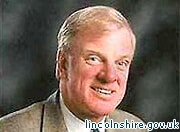The Government must reform the Public Order Act to protect freedom of speech, MPs have warned during a debate in Parliament.
The urgent calls came during yesterday’s Second Reading of the Protection of Freedoms Bill in the House of Commons.
During the debate Edward Leigh MP insisted that the Bill should be used to remove the word “insulting” from Section 5 of the Public Order Act, and listed numerous examples of people whose free speech had been restricted by the existing law.
Watch Edward Leigh’s comments
These included Christian hoteliers from Liverpool Ben and Sharon Vogelenzang who were prosecuted after a Muslim guest complained she had been offended following a discussion about Islam.
Mr Leigh, a former chairman of the Public Accounts Committee, said: “I am sure we all agree that free speech is a bedrock of true democracy. It encompasses the freedom to disagree and to challenge received opinion.
“We might not like what someone says and we might take offence, but lively debate and a robust exchange of ideas are integral parts of a true democracy.”
Manifesto
Mr Leigh also drew attention to support for changing the law from Parliament’s Joint Committee on Human Rights, Liberty, Justice, The Christian Institute and former Liberal Democrat MP Dr Evan Harris.
He added: “I note the Liberal Democrats specifically referred to reforming the 1986 Act on page 93 of their manifesto last year. It is a Lib Dem idea that we would be wise to adopt.”
Watch John Glen’s comments
Undermined
“Without it, political action and resistance to injustice and oppression are impossible. It is a precious right, and we must not allow it to be undermined.”
He concluded: “We have to ask ourselves, ‘Should the law really criminalise insulting words?’ Surely insult is in the eye of the beholder, so how can the police be expected to regulate that?
“Abusive behaviour is clear cut: we all know it when we see it, and it is right that the law addresses it. Threatening behaviour is absolutely unacceptable, and we need laws to tackle it. But ‘insulting’?
Silenced
“What would debate be like in this Chamber if an hon. Member could be silenced by an allegation from another hon. Member that he felt insulted by what was said?”
The calls for Section 5 to be reformed also attracted support from Nicola Blackwood MP, David Burrowes MP and Priti Patel MP.
And Tom Brake, a Liberal Democrat MP, told the Commons that Evan Harris is still actively campaigning to have the word ‘insulting’ removed from Section 5.
Watch Tom Brake’s comments
But James Brokenshire, a minister at the Home Office, pointed to a police report that claimed changing the law was not the solution.
“In many ways it was the constant changes to the Public Order Act that had led to operational confusion”, he said.
“The Government will continue to review the law throughout the course of this Parliament to ensure that it allows competing rights to be properly balanced.”
Last November a former senior prosecutor explained that repealing the word “insulting” from Section 5 would not affect the police’s ability to deal with genuine public disorder.
Misused
Neil Addison, a barrister and religious liberty commentator, also warned that in its current form the Public Order Act has been “misused” to attack free speech.
Mr Addison, who has in the past prosecuted countless cases involving Section 5, said: “I cannot remember a single case of genuine public disorder that relied on the word ‘insulting’ in order to secure a conviction.”
“So, if the word ‘insulting’ was to be removed from the Public Order Act, I do not see that it would cause any problem to prosecutors or police,” he continued.

